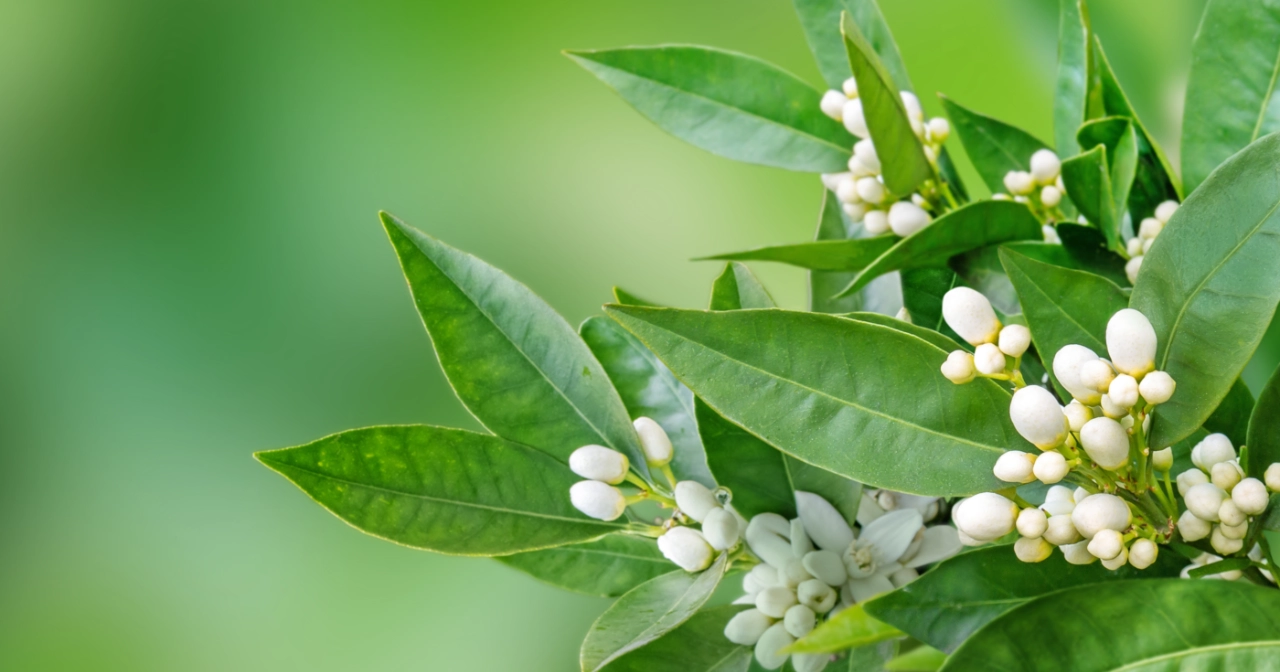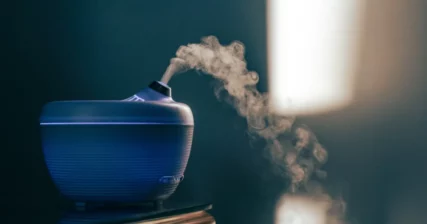Listen on: Apple Podcasts | Spotify
Among several recent essential oil-related research papers published, I came across one titled The Effect of Citrus Aurantium Aroma on the Sleep Quality in Postmenopausal Women: A Randomized Controlled Trial.
Poor sleep quality is one of the most common problems postmenopausal women deal with. This study looked at how inhalation of neroli essential oil might impact sleep quality.
What is neroli?
Neroli essential oil comes from the flowers of the Citrus aurantium, or bitter orange tree. This sometimes creates confusion in natural products, as the bitter orange itself is also used as a nutritional supplement.
Bitter orange contains synephrine, a close cousin of ephedrine, which has been shown to support fat loss without the adverse cardiovascular effects of ephedrine.
A Citrus aurantium subspecies called Citrus aurantium bergamia is also useful in natural health. This is where we get bergamot from.
With all that said, the focus of this blog post is on neroli, the essential oil from the flowers of the bitter orange tree.
Previous research on neroli
According to a 2018 review, neroli has the following biological properties in humans or animals:
| Biological Properties of Citrus Aurantium Essence | |
|---|---|
| Anti-amnesic | Antibacterial |
| Antifungal | Antioxidant |
| Anti-inflammatory | Antiseizure and anticonvulsant |
| Anxiolytic and antidepressant | Central and peripheral antinociceptive effects |
| Endothelium- and smooth muscle-dependent vasodilator | Hypotensive |
| Menopausal symptoms relief | Premenstrual syndrome (PMS) relief |
| Sedative, soothing, motor relaxant | Sexual desire enhancer |
The effects may vary based on whether neroli essential oil is used internally, topically, or aromatically.
Read also: Tangerine Essential Oil, Sedation, Sleep, and Focused Thinking.
Postmenopausal Changes
Post-menopause, women experience a variety of health challenges due to their significantly-reduced estrogen levels. Difficulty with sleep is the most common.
Sleep problems arise due to a reduction in melatonin and serotonin that follows a large drop in estrogen. Hot flashes may also cause women to wake often during the night.
Though the hormonal shift itself may lead to sleep loss and health problems, prolonged sleep debt may amplify these health problems as well.
Conventional medicine offers some solutions, but with serious risks.
Hormonal therapy, sedative and hypnotic drugs are the treatment methods for sleep disorders but they can cause harmful effects such as breast cancer, thrombosis, drowsiness, and impaired mental ability.
Abbaspoor Z, et al.
Neroli Essential Oil and Sleep in Postmenopausal Women
As mentioned above, previous studies have shown that neroli essential oil helps with many menopausal symptoms.
As for sleep, aromatherapy with neroli essential oil improved sleep in studies with people who had type II diabetes, ischemic heart disease, or heart failure, and in female nursing students.
In this recent, randomized, controlled trial, researchers divided 80 postmenopausal women, ages 45-60, with sleep problems into two groups: A control group and an intervention group.
The control group received a bottle of almond oil. The intervention group received a bottle containing a 10% concentration of neroli essential oil.
Researchers instructed both groups to put two drops of the oil they received on their left or right forearm skin, and hold their forearm 30 cm (about 1 ft.) from their nose for five minutes, twice per day, for four consecutive days per week for four weeks.
They completed the Pittsburgh Sleep Quality Index (PSQI) before the trial and at the end of the four weeks.
Consistent with other studies, the women who used the essential oil experienced a significant improvement in sleep quality.
It’s also worth mentioning that no adverse events were reported.
Read also: Effects of Rose Essential Oil on Sleep and Feelings of Anxiety.
My Comments
I always enjoy reading how various researchers describe the effects of essential oils on the body. The researchers of this study explained:
it is believed that the aroma activates the olfactory nerve and subsequently stimulates the limbic system. Depending on the type of aroma, the neuron cells release different neurotransmitters including ankylpholine, endorphin, noradrenaline, and serotonin. On the other hand, due to the association of the sense of smell with other human senses and mind, aromas can exert their effects both mentally and physically. In fact, the odor can change human’s feelings.
Abbaspoor Z, et al.
Pretty fascinating, huh?
I should also note that the researchers in this study described it as aromatherapy, but the participants applied the oil to their forearms.
Since essential oils easily penetrate the skin and enter the bloodstream when applied topically, the sleep benefits could have been at least, in-part, related to the topical application that was then used as a means to inhale the oils.
Different people like and dislike different essential oils. Sometimes, someone will tell me they’ve tried essential oils in the past, but they didn’t work. As we talk more about them, they explain that they had tried only a couple of different oils, and disliked the smell to begin with.
If you’re trying to improve your sleep, and lie in bed thinking about how much you dislike the smell of an oil or oil blend in your diffuser, you probably won’t improve your sleep. Like a good pair of shoes, you might need to try different oils in order to find the best one for you.
Maybe you should try neroli essential oil next.

Feel Better Fast. Guaranteed.
Energy+, EDGE, and MentaBiotics make up the Happy Juice supplement stack, with ingredients clinically proven to:
- decrease anxiousness scores by 55%
- decrease irritability scores by 60%
- decrease fatigue by 64%
- decrease anger 54%
- decrease tension by 45%
- decrease confusion by 43%
- decrease overall distress by 49%
- increase good bacteria by 70%
- decrease negative mood by 105%
- increase positive mood by 211%
References
Abbaspoor, Zahra, et al. “The Effect of Citrus Aurantium Aroma on the Sleep Quality in Postmenopausal Women: A Randomized Controlled Trial.” International Journal of Community Based Nursing and Midwifery, vol. 10, no. 2, Apr. 2022, pp. 86–95. PubMed Central, https://doi.org/10.30476/IJCBNM.2021.90322.1693.
Arab Firouzjaei, Z., et al. “The Effect of Citrus Aurantium Aroma on Sleep Quality in the Elderly with Heart Failure.” Journal of Babol University of Medical Sciences, vol. 21, no. 1, 1, 2019, pp. 181–87. Dosoky, Noura S., and William N. Setzer.
“Biological Activities and Safety of Citrus Spp. Essential Oils.” International Journal of Molecular Sciences, vol. 19, no. 7, July 2018, p. 1966. PubMed Central, https://doi.org/10.3390/ijms19071966.
F, Mohaddes Ardabili, et al. The Effect Of Aaromatherapy With Bitter Orange Extract On Sleep Quality In Patient With Type 2 Diabetic. no. 223, Jan. 2017, pp. 1851–61.
Shamsipour, Sareh, et al. “The Effect of Aromatherapy with Citrus Aurantium on Sleep Quality among Nursing Students: A Randomized Clinical Trial.” Acta Facultatis Medicae Naissensis, vol. 35, no. 3, 2018, pp. 236–43. scindeks.ceon.rs, https://doi.org/10.2478/afmnai-2018-0025.
Suntar, Ipek, et al. “An Overview on Citrus Aurantium L.: Its Functions as Food Ingredient and Therapeutic Agent.” Oxidative Medicine and Cellular Longevity, vol. 2018, May 2018, p. 7864269. PubMed Central, https://doi.org/10.1155/2018/7864269.
Suryawanshi, Jyotsna A. Saonere. An Overview of Citrus Aurantium Used in Treatment of Various Diseases. p. 6. Zeighami, Reza, et al. “Investigating the Effect of ‘Citrus Aurantium’ Aroma on Sleep Quality of Patients Hospitalized in the Coronary Care Unit (CCU).” Complementary Medicine Journal, vol. 4, no. 1, June 2014, pp. 720–33.



